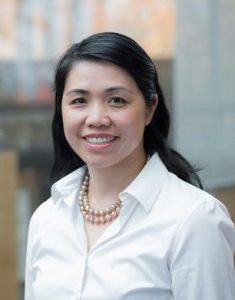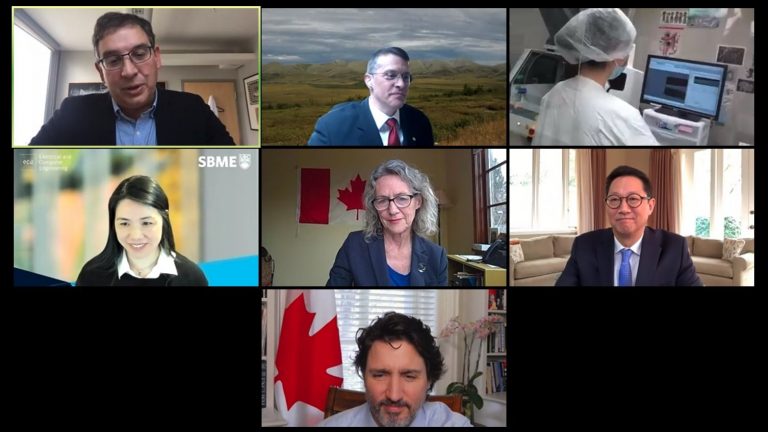
Dr. Karen Cheung / Image Source: UBC Department of Electrical Engineering.
One of the highest professional distinctions in biomedical engineering has been accorded to Dr. Karen Cheung, a bioengineering professor at UBC. She is among one of the newest members elected to the American Institute for Medical and Biological Engineering (AIMBE) College of Fellows, which represents the top 2% of medical and biological engineers.
“Many Fellows elected this year are people that I think very highly of – colleagues I’ve met through graduate school, or those I’ve served with on committees,” said Dr. Cheung, who is a Centre for Blood Research (CBR) member, as well as a professor at UBC’s School of Biomedical Engineering (SBME) and Department of Electrical and Computer Engineering.
“It’s so great to see their contributions recognized, and an honour to be elected alongside them.”
Dr. Cheung was recognized for her outstanding work on biomicrofabrication technologies and leadership in Biomedical Engineering graduate education. Her lab’s research themes include lab-on-a-chip technologies, inkjet printing for tissue engineering, and implantable neural interfaces. Her work has been published in biomedical engineering journals such as Scientific Reports, Biotechnology and Bioengineering, Lab on a Chip, and Biomedical Microdevices, among many others.
Using silicon chip technology in the fight against COVID-19
When the pandemic struck, Dr. Cheung joined the fight against COVID-19, working to develop a rapid test in collaboration with colleague Dr. Lukas Chrostowski. Using silicon chip technology, they aimed to create a low-cost, efficient, on-the-go diagnostic tool that could test for COVID-19 and other diseases. Moving forward, Dr. Cheung’s group will work to integrate microfluidic components into the chip sensors, and she and colleagues hope to create a portable prototype for user feedback.
She is also building an inkjet system for single-cell printing and biofabrication, to quickly and accurately print individual droplets that research laboratories can use for single-cell sequencing. The inkjet system’s development will contribute to a major cancer care project led by UBC researcher Dr. Samuel Aparicio and supported by a $2.4 million Canadian Foundation for Innovation (CFI) award. The researchers recently presented this work to UBC President and Vice-Chancellor, Santa Ono, as well as Prime Minister Justin Trudeau and Digital Government Minister Joyce Murray.

Dr. Karen Cheung on a call to discuss a major project for cancer care, along with UBC President and Vice-Chancellor, Santa Ono, Prime Minister Justin Trudeau, Digital Government Minister Joyce Murray, and other UBC researchers.
With an efficient printing system, this technology can help produce a viable single-cell supply for lab studies and help speed up their workflow. To optimize the system, Dr. Cheung is conducting high-speed imaging and developing new ways to track the motion of cells inside the inkjet nozzle.
Leading the way to equity, diversity and inclusion in science
As the SBME’s Associate Director and Director of its Graduate Biomedical Engineering Program, Dr. Cheung has also taken great strides to enhance the educational and work environment for students. She launched a PhD rotation program for students to explore different labs and research areas, initiated new Travel and Entrance awards, led curriculum development, and developed new core courses that better integrated applied science with elements of life science. In 2019, she was recognized with a Dean’s Award for Excellence in Service, and was named a STEM star in a 2018 list of B.C.’s most influential women.
In addition to her research and educational impacts, Dr. Cheung’s contributions extend to increasing equity, diversity and inclusion in the scientific community. As an organizer for the International Conference on Micro-Electro-Mechanical Systems (MEMS) conference, she secured funding to hold a Women in MEMS workshop that furthered discussions around the confidence gap and lack of female expert voices in media sources, and created an inaugural program of mid-career Invited Speakers, many of which were women engineering faculty. At UBC, she has played a key role in the SBME’s work towards student gender parity, and has also spoken as a panelist at various events related to EDI and women in STEM.
Dr. Cheung will be formally inducted during the AIMBE’s 2021 Annual Event on March 26, along with 174 colleagues who comprise the AIMBE Fellow Class 2021.
“I’m excited to continue working with scientists, physicians, and engineers on grand challenges,” said Dr. Cheung. “These have been such challenging times, and with resilience I know that we can adapt while still following our moral compass in everything that we do.”


